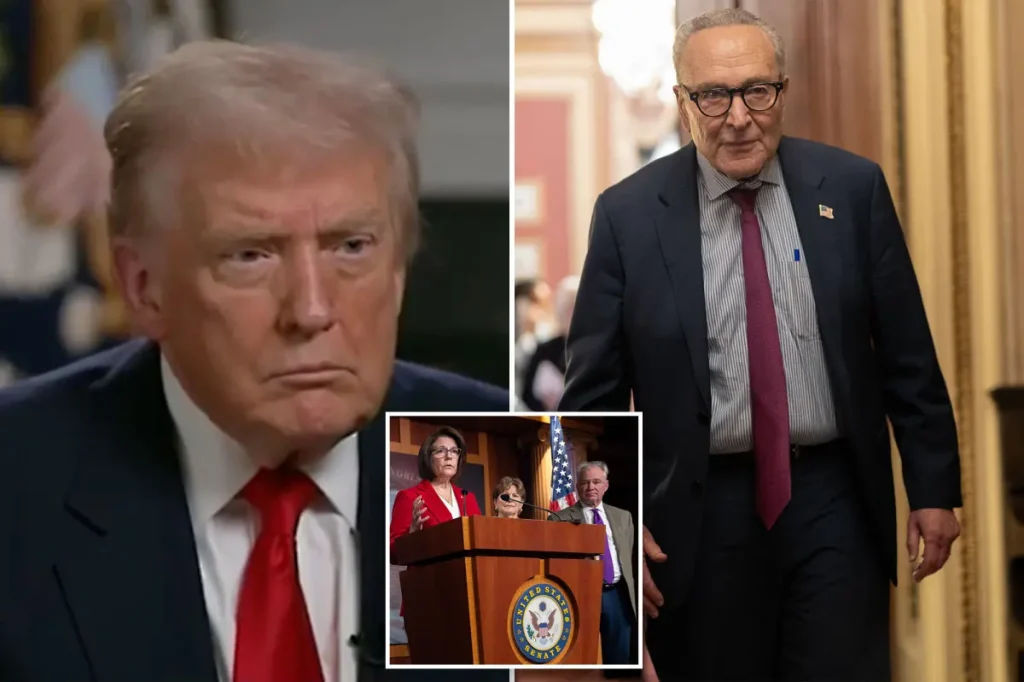Trump Criticizes Schumer’s Approach During Government Shutdown, Calls for Healthcare Reform
In a candid interview on “The Ingraham Angle,” President Donald Trump shared his thoughts on the recent government shutdown resolution and offered pointed criticism of Senate Minority Leader Chuck Schumer. The conversation with Fox News host Laura Ingraham covered the political fallout from the shutdown, healthcare reform, and Trump’s vision for preventing future government disruptions. Trump didn’t hold back when assessing Schumer’s leadership during the crisis, suggesting the Democratic leader had overplayed his hand in negotiations. “I think he made a mistake in going too far,” Trump remarked. “He thought he could break the Republicans, and the Republicans broke him.” This assessment came after eight Democratic senators broke ranks with their party to support the House-passed spending plan that ultimately ended the longest government shutdown in American history. The Senate voted 60-40 to reopen the government, with the measure heading to the House for final approval. Trump expressed a personal dimension to his criticism of Schumer, saying, “I feel badly ’cause I know Chuck Schumer,” and suggesting that the minority leader had undergone a dramatic political transformation. “I’ve known him since he was a person who loved Israel, and now he’s a Palestinian. He’s become a Palestinian… I’ve never seen a politician change so much.”
According to President Trump, the core of the shutdown battle wasn’t simply about government funding but rather Democratic efforts to secure substantial healthcare subsidies for undocumented immigrants. “What they really wanted was $1.5 trillion for people that came in illegally, people that come in through and out of prisons,” Trump claimed. He framed the Republican opposition to such measures as a matter of public safety and fiscal responsibility, adding, “We’re trying to get them out, because we don’t want 11,000 murderers in our country. You don’t it. Nobody wants it.” Trump emphasized that such healthcare provisions for undocumented immigrants would inevitably “hurt other people’s healthcare.” This characterization presented the shutdown as a principled stand by Republicans against what the president portrayed as Democratic priorities that would harm American citizens while benefiting those who entered the country illegally. The shutdown had significant real-world consequences, with thousands of government workers furloughed, nationwide flight disruptions, and the expiration of food aid programs that affected vulnerable populations.
The president took the opportunity during the interview to strongly criticize the Affordable Care Act, commonly known as Obamacare, describing it as “horrible” health insurance that has become increasingly unaffordable for Americans. “The premiums have gone up like rocket ships,” Trump lamented. “And I’m not even talking about just recently, I’m talking about for years they’ve been going up.” His critique of Obamacare focused primarily on cost issues rather than coverage provisions, suggesting that while the program might have expanded access to insurance, it did so at an unsustainable financial cost to many Americans. The rising premiums under the ACA have been a consistent talking point for Republicans seeking to reform or replace the healthcare law enacted during the Obama administration. Trump’s comments indicated his administration remained committed to finding alternatives to the current healthcare system despite previous unsuccessful attempts to fully repeal and replace Obamacare during his presidency.
In outlining his vision for healthcare reform, President Trump advocated for a more consumer-directed approach that would empower individuals to make their own insurance decisions. “I want, instead of going to the insurance companies, I want the money to go to an account for people where the people buy their own health insurance,” Trump explained. This concept appears similar to expanded health savings accounts or direct premium subsidies that would allow individuals to shop for coverage options in an open marketplace. Trump emphasized personal agency in his proposed system, adding that under his preferred approach, Americans would be “actually able to go out and negotiate their own insurance.” This vision aligns with traditional conservative healthcare principles that favor market-based solutions over government-administered programs. The president’s comments suggested he wanted Americans to “feel like entrepreneurs” in managing their healthcare decisions, implying that consumer choice and market competition would drive down costs while maintaining quality.
Looking toward the future, when Ingraham asked how Republicans might avoid another government shutdown when the current funding expires on January 30, 2026, Trump revealed that his administration was working on preventative legislation. “Well, we’re trying to put in a bill, as you know, or a bill that you can never do that again,” Trump responded. “You can’t just shut down the government because you’re trying renegotiate a deal that you didn’t [get].” This statement suggests the president was pursuing structural reforms to the budget and appropriations process that would create mechanisms to prevent funding lapses from shutting down government operations. Such legislation would potentially institute automatic continuing resolutions or other safeguards to maintain government functions during budget disagreements. This approach acknowledges the significant economic and social costs of government shutdowns while attempting to preserve the leverage both parties seek during negotiations over federal spending priorities. The prospect of such legislation raises questions about constitutional authorities and the balance of power between the executive and legislative branches in determining government funding.
Throughout the interview, President Trump framed the recent shutdown battle as a victory for Republicans and a failure of Democratic strategy, particularly on the part of Senate Minority Leader Schumer. The president’s comments reflected the intensely partisan nature of contemporary budget negotiations and highlighted his administration’s priorities regarding immigration enforcement, healthcare reform, and government operations. As the government resumed normal functions following the shutdown resolution, Trump’s remarks suggested that fundamental disagreements between the parties on issues like healthcare access, immigration policy, and federal spending would continue to shape political battles in Washington. The president’s willingness to criticize a prominent Democratic leader while outlining alternative policy visions demonstrated his characteristic direct communication style and his determination to frame political narratives in terms favorable to his administration’s agenda and accomplishments.


